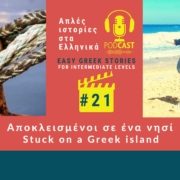The Greek author Nikos Themelis, is know for his Trilogy, but not only…
If you are looking to learn more about Greek history of the 19th and 20th century in a way that does not remind you of school textbooks, we would recommend giving Themelis’ trilogy a try. The three novels describe the socio-political conditions of the time as well as important historical events that took place in mainland Greece, Asia Minor and the Balkans, which are woven into the stories of the key characters – never a dull moment!
The first book of the trilogy, ‘The Quest’, has been translated into English , which makes it easier for beginner and intermediate students to familiarise themselves with Greek history. The other two books are only available in Greek, which is ideal for advanced learners who want to test their comprehension skills with a longer read.
THE AUTHOR Nikos Themelis (1947 – 2011)
Nikos Themelis was born in Athens in 1947. He graduated from the German School of Athens, then went to study law in Thessaloniki and, later, in Germany.
In Greece, he is known not only as a writer but also as a political consultant to Kostas Simitis, both while working across different Greek Ministries as well as during his tenure as Prime Minister of Greece.
Besides his career in politics, though, Themelis has also been a prolific writer who has published 8 novels between 1998 and 2014.
The last one was published after his death from cancer in 2011.
One of the novels we’ll see below, Η Ανατροπή (en. The Inversion), was awarded with the State Prize for Literature, under the Novel Category, in 2001.
HIS BOOKS; three novels: Η αναζήτηση, Η ανατροπή, Η αναλαμπή.
Themelis is very well-known for his trilogy, which includes three novels: Η αναζήτηση, Η ανατροπή, Η αναλαμπή.
You might notice that the titles of all three books include a noun (singular, feminine) that starts with the Greek letter a, highlighting the connection between them.
Η αναζήτηση, or as it was published in English “The Quest”
offers insight into Greece and the Balkans at the end of the end of the 19th century and the beginning of the 20th. Nikos, a young man, the son of a rich merchant who eloped with the daughter of his business partner, leaves his Zagoria village in Epirus (Northwest Greece) in search of a better fate.
His fascinating journey takes him first to the island of Mytilene and then to Smyrna in Minor Asia, which at the time was a melting pot of cultures, nationalities and religions. There, Nikos makes the most of his wealth, family name and acquaintances to become a prominent member of the local society. Through his story as well as those of the people close to him, we explore the history of one of the most turbulent periods of our modern times.
In the second part of the trilogy, Η ανατροπή,
narrates the course of the Greek wealthy middle class who lived in the neighbouring Balkan countries and southern regions of Russia at the turn of the 20th century, which was a period of important changes and upheavals in Europe. Hence the use of the word ανατροπή in the title which translates as the subversion, the inversion, the overturn. A lot of the action in the book focuses on the lives of different characters who live around the Black Sea and in the city of Odessa, which was a colorful, multicultural hub at the time with a prospering Greek community. Our key character here is Eleni, the daughter of a well-off merchant, who wants to escape the conservative life in the small Epirus/Macedonia village where she grew up and explore a lifestyle that allows women more freedom and independence, which is how she ends up in Odessa.
In the last but not least part of the trilogy, Η αναλαμπή
(the English equivalent here is the noun flash but it would be used figuratively, as in a sudden sensation, a sudden brilliant idea, a flash of inspiration, etc.), we see the story of a middle class family with a big secret. Diamandis, a well-off textile merchant in Athens, and his wife Aristea one days receive an unexpected present: someone leaves a baby at their doorstep. Aristea takes in the little boy, Stefanos, as if he were her own child but is unaware of his true identity, something that Diamandis and his brother Dimitris know but decide not to tell her… We follow Stefanos’ life as he grows up during a time of great political upheaval for Greece, i.e. the beginning of the 20th century all the way to the interwar period.
This period was marked by the Megali Idea[1] (en. Great Idea) and what is called the Great Division caused by the collision with regards to the foreign policy of Greece in the period of 1910–1922 between King Constantine I and Prime Minister Eleftherios Venizelos.
++++++++++++++++++++++++++
NOTE
[1] The Megali Idea was a concept that expressed the goal of reviving the Byzantine empire, by establishing a Greek state, which would include the large Greek populations that were still under Ottoman rule after the end of the Greek war of Independence (1821–1828) and all the regions that traditionally belonged to Greeks since ancient times (parts of the Southern Balkans, Asia Minor and Cyprus).
++++++++++++++++++++++++++++++++
Do you like to read books?
There is an abundance of modern Greek literature that is waiting to be explored!
If you would like to learn more about Greek literature, novels and authors, from 1880 till of today,
take a look at this interesting eBook “Journey into Modern Greek Literature”
+++++++++++++
If you are in the beginning stages of learning Greek,
your very first Greek book to read could be this Greek Easy Reader “Lydia”,
]
++++++++++++++++++++++++++









